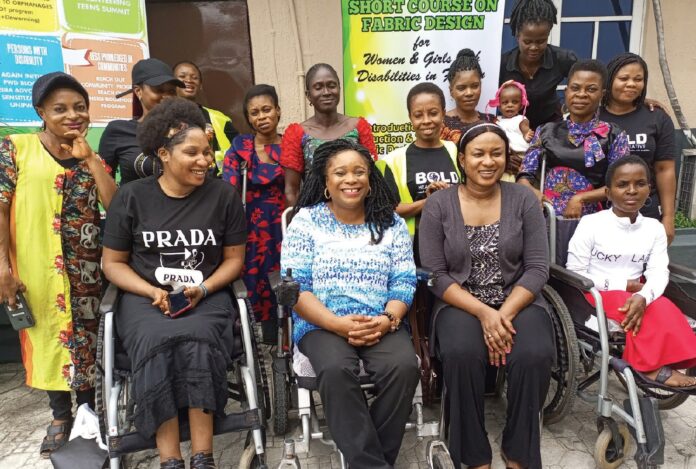In a bid to enhance labor rights and advocate for improved working conditions for people with disabilities in Nigeria, the Solidarity Center West Africa organized a comprehensive virtual training session on developing a disability inspection checklist. The event, which took place on Friday drew participants from various sectors, underscored the need for inclusive workplaces and highlighted the systemic challenges faced by workers with disabilities.
Opening the session, Janet Anaele, the Solidarity Center West Africa Program Officer, emphasized the critical role of awareness in transforming the labor landscape for people with disabilities. “This training is part of our ongoing efforts to raise awareness about labor rights and advocate for better working conditions for people with disabilities in Nigeria,” Anaele stated. She further noted that the workshop aimed to identify challenges related to the rights of disabled workers that should be addressed in collective bargaining agreement negotiations.
Anaele encouraged participants to share their insights and ideas for developing an inspection checklist that would guide labor inspectors in assessing workplace accessibility and inclusivity. This checklist is envisioned as a crucial tool for labor unions to engage effectively in collective bargaining both during and after the project’s lifespan.
The session featured an in-depth presentation by Patience Ogolo Dickson on a recent research report titled “Securing Equal Access to Decent Work in Nigeria: A Report by Workers with Disabilities.” The study, which involved 660 workers with disabilities and 87 union members, revealed striking statistics about the current state of employment for disabled individuals in Nigeria.
Of the respondents, 58.7% reported having a physical disability, while 36.2% had a sensory disability, and 6.2% had an intellectual disability or mental illness. The study also highlighted a significant gender disparity, with 51% of participants being female and 49% male. Notably, 58.5% of workers with disabilities use some form of aid, while 41.3% do not, primarily due to financial constraints rather than a lack of need.
A concerning finding from the study was that 53% of workers with disabilities do not have official identification, which is crucial for accessing various services and rights. Furthermore, 43.4% of workers with disabilities earn less than the minimum wage, a stark contrast to the 20.6% who earn the minimum wage and the 24.8% who earn above it. This wage disparity is exacerbated by the Ministry of Labour’s limited capacity to enforce compliance with existing regulations.
The study also revealed that workers with disabilities are predominantly employed in the informal economy (29%), followed by the public sector (24%), the private sector (19%), the education sector (14%), the manufacturing sector (9%), and the health sector (5%). Additionally, 24.4% of workers with disabilities reported experiencing some form of gender-based violence and harassment (GBVH) in the past two years, with many incidents going unreported due to a lack of awareness and effective reporting mechanisms.
Ndifreke Andrew Essien, presenting on the Disability Inclusion Toolkit, introduced the inspection checklist designed to improve workplace inclusion for persons with disabilities. “This checklist is centered on the needs of workers with disabilities and focuses on comprehensive accessibility,” Essien explained. The checklist will evaluate aspects such as reasonable accommodation, usability of accessible facilities, availability of such facilities, and employer attitudes towards employees with disabilities.
Participants were encouraged to contribute their ideas to refine the inspection checklist. Suggestions included the need for robust organizational policies on disability inclusion and increased involvement of labor unions in advocating for the rights of disabled workers.
The virtual training also highlighted the Solidarity Center’s initiative to form alliances with other organizations to conduct joint advocacy. This collaborative approach aims to learn from successful models in other countries, promote unity, and share expertise to achieve more significant results.
The session concluded with a series of recommendations for the government, employers, workers, and unions. Key proposals included revising laws to ensure reasonable accommodation in employment, launching public awareness campaigns against disability discrimination, introducing a Disability Tax Fund for social security, and harmonizing public policies to provide tax incentives for private employers complying with disability quotas.
For employers, the recommendations emphasized making reasonable adjustments for disabled workers, providing access to survivor-centered support, setting up disability management programs, and establishing safe, confidential reporting mechanisms for GBVH cases.
Workers were encouraged to report non-compliance and participate in advocacy campaigns, while unions and civil society organizations were urged to include workers with disabilities in collective bargaining and raise public awareness about their rights.
In conclusion, the Solidarity Center’s virtual training on developing a disability inspection checklist marks a pivotal step towards securing equal access to decent work for persons with disabilities in Nigeria. By fostering an inclusive and equitable work environment, stakeholders can ensure that all Nigerians, regardless of their abilities, have the opportunity to contribute to and benefit from the nation’s economic and social development.


